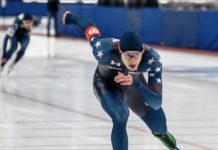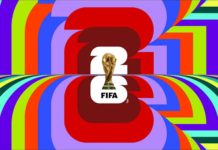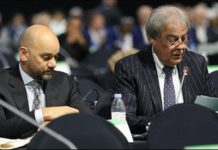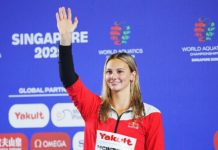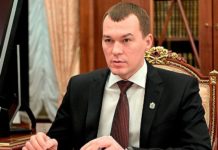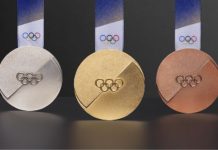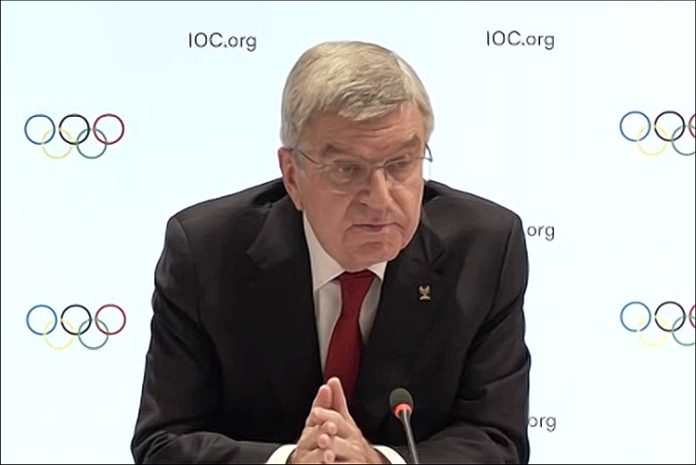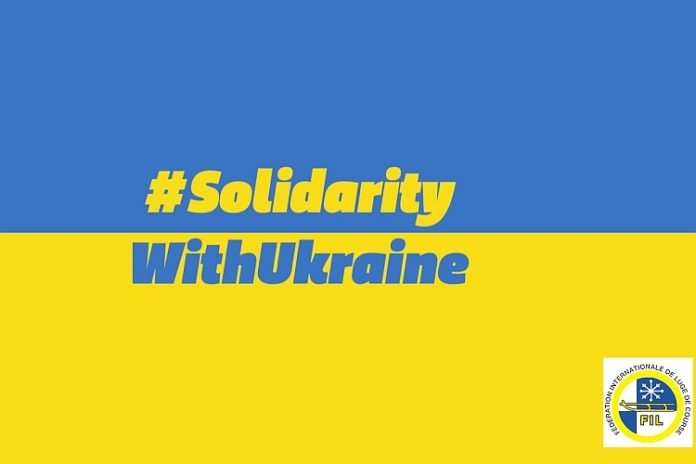★ The Sports Examiner: Chronicling the key competitive, economic and political forces shaping elite sport and the Olympic Movement.★
★ To get The Sports Examiner by e-mail: sign up here! ★
≡ THE 5-RING CIRCUS ≡
1. IOC convenes conference to look for local safeguarding ideas
2. Bach calls government critics of IOC’s Russia stance “deplorable”
3. Observed: IOC anger trying to mask its 2024 vulnerabilities
4. Ukraine, Czech, German and Polish officials lambast IOC position
5. Russian star Dalaloyan says no one will leave their clubs
The International Olympic Committee helped create the Court of Arbitration for Sport, the World Anti-Doping Agency and the International Testing Agency and now wants to find a system to help alleviate athlete abuse on the local and national level. An online conference will be held Friday to kick off the effort, to which the IOC has pledged $10 million as a start. IOC President Thomas Bach called government criticisms of the announced recommendations on Russian and Belarusian re-entry to international sport “deplorable” and accused the critics of double standards. Opinion: Bach’s protestations do not mask what is actually a very weak position for the IOC, which could get much worse. But nothing is going to be settled for many months yet. Those government criticisms came from multiple nations: Ukraine of course, but also the Czech Republic, Poland and especially from German Interior Minister Nancy Faeser. Russian gymnastics star Artur Dalaloyan told Russian television that he will not change his club affiliation – closely tied in with law enforcement – in order to compete internationally.
● Panorama: Olympic Winter Games 2026 (Milan Cortina budget confirmed at €1.5 billion) = Athletics (IOC recognizes Demus and Qieyang Shijie as 2012 gold medalists) = Fencing (Polish sports minister will allow Russian who sign morality oath) = Shooting (Bartekova and Pittini win Skeet World Cup finals) = Swimming (McIntosh and Liendo win again) ●
1.
IOC convenes conference to look for local safeguarding ideas
The horrific Larry Nassar tragedy within American gymnastics that exploded in 2016 has led to the exposure of many other abuse issues in multiple sports and multiple countries. Now the International Olympic Committee is getting into the fight.
The IOC was the instigator of the creation of the Court of Arbitration for Sport in 1984, the World Anti-Doping Agency in 1999 and the International Testing Agency in 1999. On Thursday, IOC President Thomas Bach explained a new effort to explore solutions to abuse issues:
“A number of International Federations and National Olympic Committees to coordinate the approach with regard to safeguarding, given the successful work of the IOC has already done in these two areas and given the growing number of requests coming to the International Federations and the National Olympic Committees.
“For this reason, we have organized tomorrow [31 March] a conference with the Olympic International Federations, who all have responded to this invitation. This conference will have the task, how to identify the best approach to establish independent systems to strengthen safeguarding at the local and national level, in collaboration with all Olympic Movement stakeholders.
“And I would like to emphasize here, the local, and the national level, because these incidents , these tragedies, they’re all happening on a local level, in most cases, in a pretty close circle.
“And in order to get to the root of this danger, for sport and for society, we have to address these issues on this local level, on the roots, and directly. We cannot wait and trust that the concerned athletes or other people – the victims – that they have to go way up through different levels, then up to an international level or to the IOC, to present their case and to have justice being done.
“And in order to establish this independent system on the local and national level, the IOC is dedicating a budget of 10 million U.S. dollars for the next Olympiad.
“To coordinate this work, we have today established a working group, which will be chaired by IOC Executive Board member Prince Feisal [Al Hussein JOR], who has been working on safeguarding issues with great success for many, many years and tomorrow, we will invite the International Federations and then also the National Olympic Committees to take part in such a working group.”
It’s a start, and while the issue would appear to be one well beyond the IOC’s reach as a worldwide organization, no one thought much of the Court of Arbitration for Sport, WADA or ITA initiatives either. A potentially important initiative.
2.
Bach calls government critics of IOC’s Russia stance “deplorable”
IOC President Bach has called today’s fragmented geopolitics “aggressively divisive” and now he has enthusiastically joined in.
Eschewing his usual diplomatic tone, Bach ripped into critics – sampled below – of the IOC Executive Board’s recommendations for Russian and Belarusian re-entry into international competition during Thursday’s news conference from Lausanne:
“We have taken note of some negative reactions, by some European governments in particular. I can only reaffirm what the Olympic Movement and all the stakeholders have already made very clear before: that it is deplorable to see that some governments do not want to respect the majority within the Olympic Movement, and of all stakeholders, nor the autonomy of sport, which they are praising and requesting from other countries, in countless speeches, U.N. resolutions, European Union declarations and at every other opportunity.
“It is deplorable that these governments do not address the question of double standards, with which we have been confronted in our consultations. We have not seen a single comment from them about their attitude towards the participation of athletes whose countries are involved in the other 70 wars and armed conflicts in the world.
“It is even more deplorable that they grossly neglect the very clear statement of the two Special Rapporteurs from the U.N. Human Rights Council, while in other issues, they are always highlighting their firm requests for the respect of human rights.
“Discussions and reactions from the Olympic Movement are making it very clear that these government interventions have even strengthened the unity of the Olympic Movement. All stakeholders make it very clear again: it cannot be up to the governments to decide which athlete can participate in which competition. This would be the end of world sport as we know it today.
“And the Olympic Movement stakeholders are very concerned about this politicalization of sport. They are very concerned about the attitudes of these governments wanting to take over the participation, and the decision of participation in sports events in their country or even in other countries.”
Bach then noted messages of support from the continental associations of National Olympic Committees and the Association of Summer Olympic International Federations (ASOIF), and the furious reaction from Russian officials, who complained bitterly about all of the restrictions. So:
“That both sides in this confrontation are not satisfied – to say it diplomatically – might indicate on the other hand, that we found some middle ground, on which we all can move forward to make a contribution to understanding and peace through sport.”
Asked why the IOC is treating the Russian invasion of Ukraine differently than the 70 other conflicts he mentioned, he replied: “Because this was a blatant violation of the Olympic Truce” and said that “solidarity efforts” were also being made in view of conflicts in Yemen, Ethiopia, Syria and elsewhere, and said that governments “were not dealing with the issues in the same way [as with the Russian invasion].”
He further defended the IOC’s approach, referring to the CrisisWatch list of 70 current armed conflicts:
“If you would say a country at war would not participate, we would not be alone in Paris, but there would be very few. … If you would exclude all of them, then what would be the meaning of such Games? And it would not be a universal, international competition any more.”
Bach later also noted, however, that “we will not interfere into the sovereignty of a government or a state.” He emphasized that the International Federations will have “sole authority” to decide their eligibility standards, although he has called on the summer-sport and winter-sport federations to come up “harmonized” standards.
With the ban on Russian and Belarusian athletes and officials involved in the military, the IOC Executive Board referred to the IOC Ethics Commission the question of what to do about the IOC members in Russia: Shamil Tarpischev and Yelena Isinbayeva.
3.
Observed: IOC anger trying to mask its 2024 vulnerabilities
IOC chief Bach’s well-prepared statement of outrage read at Thursday’s news conference was a time-honored response from someone in the IOC’s position, holding a weak hand.
In fact, if the French government enforces the position held by Paris Mayor Anne Hidalgo (Socialist Party), there will be no Russian or Belarusian athletes at the 2024 Olympic Games because the French government would simply not allow them to enter the country.
That’s real power, backed up by law enforcement and an army.
It would also be in complete contravention of the covenants made by the French in the Host City Agreement signed in 2017 and put the French in the position of breaking its promises, but leaving the IOC in an impossible position.
Bach indicated that the IOC’s decision on whether to have Russian and/or Belarusian athletes at Paris 2024 will be made at a later date, and based on his comments on Thursday, probably not until sometime in 2024 itself. At that stage, there is no way to find any kind of “emergency” host for 2024 or even 2025; even permanently-ready Los Angeles would not be an option as venues would have already arranged for events for the coming year. This is why Olympic Games are attributed so far ahead of time.
The experience of the International Paralympic Committee in Beijing in 2022 is instructive. By the time that event was ready to open, Russia had invaded Ukraine, but the IPC agreed on 2 March 2022 – two days prior to the Opening Ceremony – to allow Russian and Belarusian athletes to compete as neutrals. A day later, IPC President Andrew Parsons (BRA) announced:
“In the last 12 hours an overwhelming number of members have been in touch with us and been very open, for which I am grateful. They have told us that if we do not reconsider our decision, it is now likely to have grave consequences for the Beijing 2022 Paralympic Winter Games. Multiple NPCs, some of which have been contacted by their governments, teams and athletes, are threatening not to compete. …
“With this in mind, and in order to preserve the integrity of these Games and the safety of all participants, we have decided to refuse the athlete entries from RPC and NPC Belarus.”
Russia had a team of 26 athletes in Beijing already. Said IPC spokesman Craig Spence (GBR), also on 3 March 2022:
“What we’ve seen in the 14 hours since is a move from letters of ‘We think you should ban’ to ‘Now we’re thinking of going home. We’re not playing.’ That threatens the viability of this event. So that’s a huge change. If we don’t act on that, then we’re crazy. So we have and we’ve acted and we’ve made again a decision based on the fact that the position of our NPCs has gone from one of, a recommendation or suggestion to one of a threat, almost. We’ve acted on that.
“The tensions are building in the Village. It’s better to act now than wait until something happens.”
Unlike the IOC, the IPC suspended the Russian and Belarusian national committees and is yet to determine what to do about them for Paris in 2024.
The IOC has plenty of time to change its approach. Olympic super-historian Bill Mallon, one of the founders of the Olympedia statistical site, explained on Twitter last year:
“At the 1971 IOC Session, the IOC ruled that Rhodesian athletes could compete, but only using British uniforms, the Union Jack as the flag, and with the British anthem. …
“Rhodesia, later Zimbabwe, practiced apartheid, however, including in sport. Shortly before the 1972 München Olympics, all the African nations threatened a mass boycott if Rhodesia was allowed to compete. …
“Two days before the Opening Ceremony, the IOC voted (36-31 with three abstentions) to withdraw the invitation to Rhodesia for the 1972 Olympic Games. Virtually the same situation just occurred at the Beijing 2022 Paralympics.”
One more note on Bach and the IOC’s unfailing allegiance to the United Nations. Russia will assume the Presidency of the U.N. Security Council this Saturday, 1 April 2023, for 30 days as per the rotation protocol. Not a joke. Really. The head of the country that will preside over the U.N. Security Council next month is wanted for war crimes by the International Criminal Court, but will head the group that is responsible for international security. And to which the IOC has pledged its adherence.
4.
Ukraine, Czech, German and Polish officials lambast IOC position
There was no shortage of governmental reactions to the IOC’s Tuesday announcement of recommendations to allow individual Russian and Belarusian athletes to return to international competitions.
Ukrainian Foreign Minister Dmytro Kuleba tweeted, over a video of Russian athletes in military parades and events:
“Sports, state propaganda, and the army are indivisible in Russia. And now Putin has already introduced not only politics, but also war crimes into sports. There is no way for Russian or Belarusian athletes to compete in the Paris Olympics or any other major sporting event.”
The head of the Czech national sports agency, Ondrej Sebek, said in an interview:
“I was very surprised by the IOC decision. Our position on the participation of Russian and Belarusian athletes has been the same since the beginning of the war: as long as the war lasts, no athletes from the countries that provoked it should be allowed to participate in international sporting events, let alone the Olympic Games.
“Major international sports associations in football, hockey, basketball, athletics and biathlon continue to exclude Russian athletes because of the war. The IOC is going in the exact opposite direction and is actually encouraging sports federations to allow Russian athletes to compete. We find this unacceptable and will seek to change the IOC’s position.”
Poland’s Bureau of International Policy head Marcin Pszydach told Polish Television:
“I think that what the IOC is proposing at the moment is very disappointing for many of us, diplomatically speaking, we all understand that Russian aggression is connected with it. …
“Such a decision [on a boycott of Paris 2024] should be worked out in a broader coalition of states, and only then, if such a broad front could be taken, one can talk about hard decisions and hard recommendations.”
The most stinging rebuke came from Nancy Faeser, the head of the German Interior Ministry, in a multi-part Twitter thread:
“The IOC’s decision is a slap in the face for Ukrainian athletes. They deserve the solidarity of international sport. The least that Ukraine can expect is a clear stance. International sport must unequivocally condemn the brutal Russian war of aggression.
“This is only possible with a complete exclusion of Russian and Belarusian athletes. The fact that the IOC does not want to allow members of the Russian military or teams is only the absolute minimum and is not enough.
“There is no reason whatsoever for Russia to return to world sport. Putin is continuing his criminal war with appalling brutality against Ukrainian civilians.
“The Russian military kills countless Ukrainians every day, including numerous athletes. Olympic Games do not take place in a vacuum.
“Anyone who lets the warmonger Russia use international competitions for its propaganda harms the Olympic ideal of peace and international understanding.”
Bach was asked about the criticisms and noted, “We will not punish the athletes or an NOC for the behavior of their government. What counts for us is the decision of the National Olympic Committees.”
Marcin Nowak, the head of the organizing committee for June’s European Games in Poland, told RFM Radio, “Under no pretext and in any way, the athletes representing Russia and Belarus will not take part in our events.” In case an International Federation removes Olympic qualifying status from an event to this stance – the European Games is set to as as a qualifier in 18 sports – those events “simply will not take place.”
5.
Russian star Dalaloyan says no one will leave their clubs
With the IOC’s ban on Russian and Belarusian athletes who are “contracted” to the military or national security services of their countries, a lot of questions remain unanswered. Near the top will be whether “national security” also means local police units and affiliated organizations such as Russia’s famed Dynamo Sports Club.
If so, the cynical assumption, of course, is that athletes will simply switch clubs.
Russia’s Match TV asked gymnastics star Artur Dalaloyan, a Tokyo 2020 Team gold medalist and a World Champion in All-Around and Floor, if he would change clubs in order to be able to compete again:
“In fact, I believe that no one will succumb to these recommendations. We all have values. Yes, my club Dynamo represents the [governmental] power structure. The whole team around me is something valuable and important to me. It’s been built over the years. I appreciate the fact that I represent Dynamo and the power structure. I’m grateful that they helped me to train further. And because of some recommendations I will not go to leave the club I love, which I have represented all my life.
“I hope that most athletes will not be like these recommendations. I am sure that our Olympic Committee and the Ministry of Sports will challenge these recommendations and will do some work to change this framework somehow. …
“Every man in our country is obliged to serve in the army, one way or another everyone is connected to the law enforcement agencies! However, athletes also have contracts with the government. There are sports teams within these law enforcement agencies that help athletes at the most responsible and important time in their lives. This allows athletes to continue to do their thing while serving in the military. So that athletes are comfortable to reach the heights, the goals they set. That’s important. So these recommendations are nothing more than attempts to disrupt, to crack our system that has been developed over the years. I don’t know how to put it mildly.”
≡ PANORAMA ≡
● Olympic Winter Games 2026: Milan Cortina ● The Milan Cortina organizing committee confirmed its “lifetime budget” of “around” 1.5 billion Euro (about $1.636 billion U.S.) – as stated in its bid – will remain in place.
Four new domestic sponsorship partners have been announced, with more coming, and the demolition of the Eugenio Monti bob and luge track from the 1956 Winter Games has begun, opening the way for construction of the new facility as dictated by the area’s development plan.
● Athletics ● The IOC Executive Board approved changes in results due to years-after doping disqualifications from the London 2012 Games, re-awarding medals in the women’s 400 m hurdles and 20 km walk.
In the hurdles, Russian Natalya Antyukh won in 52.70, but was disqualified. American Lashinda Demus is the new gold medalist (52.77), followed by Zuzana Hejnova (CZE: 53.38) and Jamaican Kaliese Spencer (53.66).
In the walk, Russian Elena Lashmanova won in 1:25:02 and Olga Kaniskina was second (1:25:09), but both have been disqualified for doping. That means China’s Qieyang Shijie becomes the winner (1:25:16), followed by teammates Hong Liu (1:26:00) and Xiuzhi Lu (1:27:10).
● Fencing ● An FIE women’s Foil World Cup is scheduled for 21-23 April in Poznan (POL), with the country’s sports minister, Kamil Bortniczuk saying the country will allow Russian and Belarusian athletes as neutrals – as the FIE will require as of 16 April – if they sign a declaration that they “do not support military actions and stand against war crimes.
“If a Russian athlete signs this declaration, it will serve as a certificate of morality, and then he or she will be able to participate in competitions. We will be demanding that this declaration be signed at all sports tournaments held on Polish territory.”
● Shooting ● At the ISSF Shotgun World Cup in Larnaca (CYP), London 2012 Olympic bronze medalist Danka Bartekova (SVK) showed she is still going strong at 38.
She won the women’s Skeet final, 35-30, over China’s Jinmei Gao, hitting 22 of her final 24 targets, for her sixth career World Cup victory.
Italy’s Erik Pittini won the men’s Skeet, 38-35, against Finland’s Tokyo fourth-placer Eetu Kallioinen, for his first career individual World Cup gold. Germany defeated Cyprus, 6-4, in the Mixed Team Skeet final.
● Swimming ● New women’s 400 m Free world-record holder Summer McIntosh, 16, was back in the water at the Canadian Trials meet in Toronto on Thursday, winning the 200 m Medley in 2:06.89, fastest in the world in 2023 and a World Junior Record. She moves to no. 4 all-time, with the sixth-fastest time in history. She has more events to come.
Canadian sprint star Josh Liendo set the Canadian record twice in the men’s 100 m Fly, winning the final in 50.36, moving him to no. 5 all-time. He won the men’s 50 m Free final on Thursday in 21.80, fastest in the world in 2023.
¶
You can receive our exclusive TSX Report by e-mail by clicking here. You can also refer a friend by clicking here, and can donate here to keep this site going.
For our updated, 651-event International Sports Calendar (no. 2) for 2023 and beyond, by date and by sport, click here!







